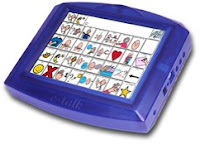Communication
Augmentative and Alternative Communication are all forms of
speech (except oral) that people use to express ideas, thoughts, wants, and
needs. This can also include gestures,
pictures, symbols, and writing. The two
types of AAC systems are unaided and aided, in which an individual either uses
just their body to communicate or must rely on the help of tools or
devices. Children who have difficulty
with their speech development often employ the help of aided AAC systems. These can include either no/ low tech devices
or high tech devices.
 The
most common forms of no/low tech tools to help children express themselves are
by use of graphic boards or gesturing and signing. These can easily be implemented into the classroom
because they are cost effective and do not take much time to explain how to
use. Graphic boards may be hung up
against a wall or kept at a child’s desk for easy access, and the use of
gesturing or signs can take place anytime there is a mutual non-verbal connection
(such as eye contact) between the student and the teacher or other
students. These tools may be simple but
can have a drastic and lasting impact on the child and their ability to
communicate with others in an educational situation.
The
most common forms of no/low tech tools to help children express themselves are
by use of graphic boards or gesturing and signing. These can easily be implemented into the classroom
because they are cost effective and do not take much time to explain how to
use. Graphic boards may be hung up
against a wall or kept at a child’s desk for easy access, and the use of
gesturing or signs can take place anytime there is a mutual non-verbal connection
(such as eye contact) between the student and the teacher or other
students. These tools may be simple but
can have a drastic and lasting impact on the child and their ability to
communicate with others in an educational situation. There are also some forms of high tech tools that can be helpful for children in expressing themselves. One such device is a Voice Output Communication Aid (VOCA) which is a sort of recording device that uses digitized speech. It is battery operated and can be used for single words or short phrases. It works by incorporating pictures of objects over an area of buttons. When these pictures are pressed, it plays back the recorded word or phrase that is linked to that graphic and is voiced aloud. This can be used in the classroom for a student that has a speech impediment because it allows them to communicate effectively with the help of recorded dialogue, and also demonstrates the phonetics of how to pronounce words. In this way, it can be used to help develop language as well as reinforce it for those with difficulties.
Accessibility
An
input device is a device that can be used to insert data into a computer or
other computational device. These can be
common items in the technology world such as a computer mouse or keyboard. However, for those with disabilities these
can be difficult to use, so special devices have been created for those who may
need extra help. These can be either
hardware or software options.
 For
example, a hardware device that was created to help those with physical or
visual impairments is the Bat Keyboard.
This is a one handed keyboard with limited keys that can replicate the
function of a full keyboard with the added benefit of efficiency. It works by creating simple key “chords” and
combinations to type out all the letters and symbols that a regular keyboard
offers, with either the left or right hand.
It is designed to reduce physical strain while typing and eliminates the
need for recognizing lettering on a keyboard.
This tool can be used in the classroom by easily plugging into an
existing computer for any child who needs assistance typing.
For
example, a hardware device that was created to help those with physical or
visual impairments is the Bat Keyboard.
This is a one handed keyboard with limited keys that can replicate the
function of a full keyboard with the added benefit of efficiency. It works by creating simple key “chords” and
combinations to type out all the letters and symbols that a regular keyboard
offers, with either the left or right hand.
It is designed to reduce physical strain while typing and eliminates the
need for recognizing lettering on a keyboard.
This tool can be used in the classroom by easily plugging into an
existing computer for any child who needs assistance typing.
An
example of an assistive technology software program is TextAloud. In this program, documents from the computer
can be read out loud and also saved to common MP3 devices to be played back at
a later time. It can be used in the
classroom to help children who have difficulty reading or have vision
impairment. TextAloud can read text from
online books, documents that include project directions, e-mails with
information, and more. It is easy to use
and easy to install on any computer.
Blogs I commented:
Gina
Courtney O
Blogs I commented:
Gina
Courtney O


Gesturing and signing is a great example of a no/low-tech communication tool! It is always a great tool because it is pretty universal. There is no cost and the different gestures are fairly simple and easy to understand. Good job Katherine!! :)
ReplyDeleteI love how you chose to research Sign Language I am personally taking up classes in American Sign Language and think that it is so beneficial to know and use with people who are not only deaf or hard of hearing but with people who have problems with communicating (It can even be used by infants).
ReplyDelete